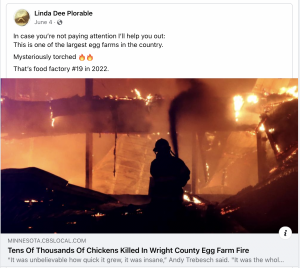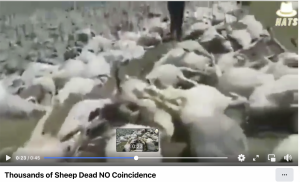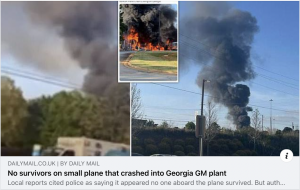It wasn’t long ago that conspiracy theories in social media posts took over newsfeeds claiming that food plants are being targeted in a grand scheme by …”someone” (most posts aren’t really clear about who is to blame here) attempting to harm our food supply. The posts spread like fire, no pun intended, and the biggest concern expressed by these unofficial watchdogs was that nobody was investigating the merit and reasons behind such events.

One post lists 97 different fire incidents from late 2021 into summer of 2022. Another claims a plane flew into a General Mills plant. Others share how thousands of animals were “destroyed” at different plants.
Adding to the fuel was the terrible instance where thousands of cattle lost their lives in feedlots across Kansas in June. Some people believe it was due to poisoning.
Another post shortly after the Kansas disaster showed sheep supposedly experiencing the same, sad fate as cattle in Idaho.

But these posts were misleading and didn’t share the entire story. In fact, there was a lot of bad information spread by paranoid conspiracies that have seemingly gripped people in the past few years.
The truth is that, of the thousands of food plants we have in this country, there are commonly incidents of fires being reported. One look into a fire department call log and you could find plenty of fires burning structures of all kinds, from homes to businesses.
When there are chemicals and industrial technologies at play, fire is always a possibility — and, while alarming, these incidences aren’t due to some greater evil trying to endanger our food supply.
In an article by Reuters, Tom Super, senior vice president of communications at the National Chicken Council, stated that, in any given year, there are always a few fires that are accidentally started, but they are typically contained quickly and have no affect on supply.
And the plane that allegedly crashed into the GM plant? Completely false. It crashed near the plant, but didn’t cause any damage to the plant itself.

While some of the fires mentioned were devastating, many were only small fires that didn’t set the plants back too far. In fact, the the U.S. Department of Agriculture publicly reports any food shortages or supply. Even during the conflict in Ukraine, the U.S. is self-sufficient, and the USDA is in constant contact with food manufacturers and grocery stores in order to stay updated on current food supply.
In summary, the fires that have occurred wouldn’t be nearly enough to impact our food supply.
As for the cattle situation in Kansas, veterinarians and experts have all discussed how extreme weather conditions, including extreme heat to intense humidity, likely caused the sudden deaths of all the cattle. Unfortunately, this was a tragic, freak accident. Mother Nature has shown us that it is capable of terrible things, even when they don’t fully make sense to us.
The sheep video is also a prime example of misinformation — the video was originally filmed in August of 2021 in Georgia and showed sheep that had died during a thunderstorm. Another post shows sheep in Idaho that were not killed due to the same cause as the cattle in Kansas, but rather, wolf attacks.
When our community starts spreading misinformation before asking questions, we are not helping our industry. Isn’t this what we shame consumers and politicians for? Taking something and immediately jumping to conclusions without getting the entire backstory? We are fearmongering and creating troubles within our industry for no reason. Sometimes bad things happen; sometimes they don’t make sense to us. That doesn’t mean there is something much darker going on. We can, instead, take some of that brain power and put that toward solving the predation problem ranchers face, preventing cattle from enduring heat-stress deaths, and improving the safety of processing plants.
It’s healthy to question everything. It’s also a good rule not to believe everything you read on the internet.
Markie Hageman majored in agribusiness at Fort Hays State University. She is actively involved in her state Cattlemen’s Association, Young Farmers chapter, and National Cattlemen’s Beef Association. Her AGDAILY.com articles can be found here.



